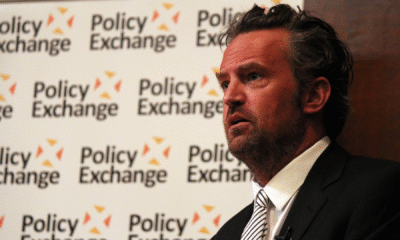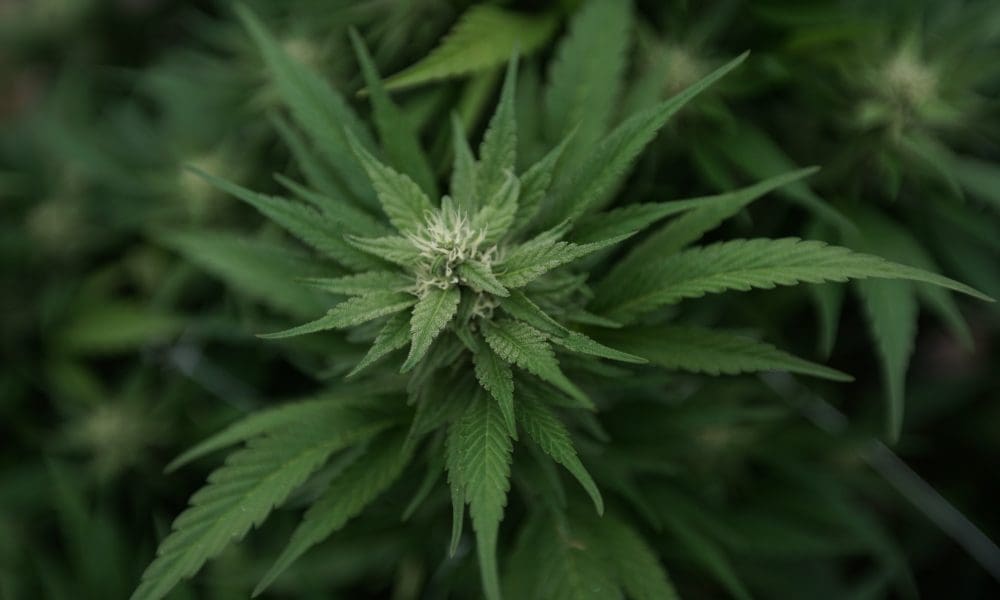featured
Anti-Marijuana Physician Who Criticized Rescheduling Proposal Joins Trump White House’s Drug Office
Published
5 days agoon

The White House Office of National Drug Control Policy (ONDCP) is adding to its team a medical professional who has linked marijuana use to suicide, advocated against a Florida legalization measure and criticized health agencies’ move to reschedule cannabis.
She has also said it is an “insult” to refer to cannabis as “medical.”
Roneet Lev—an emergency medicine and addition physician who previously served as chief medical officer at ONDCP under the first Trump administration—announced on Monday that she’ll be rejoining the office for the chance to “save lives on a much bigger scale.”
While she didn’t mention marijuana in the announcement on her podcast “High Truths on Drugs and Addiction,” Lev has previously spoken extensively about her issues with cannabis—describing it as an understated public health risk and arguing that commercial interests are the driving force behind the legalization movement.
In one episode of her podcast from June 2024, she dedicated over an hour to a discussion with prohibitionist advocates about the marijuana rescheduling process that was initiated under the Biden administration, making clear she strongly disagrees with the top federal health agency’s recommendation to move cannabis from Schedule I to Schedule III of the Controlled Substances Act (CSA).
She said that people who are accepting the scientific findings that led to the recommendation,”including some in the medical community,” are “drinking that same Kool Aid again” with marijuana as they did with prescription opioids. And she claimed that the U.S. Department of Health and Human Services (HHS) produced a flawed report on cannabis, with mistakes in “like every single sentence.”
“When it comes to marijuana, the harms are right in front of our eyes—but we ignore the data and follow the industry talking points just like we did in the oxycontin days,” Lev said during the segment, which featured prominent prohibitionists such as Bertha Madras, who also previously served as an ONDCP official.
The revised review process that HHS relied on to reach its Schedule III determination for marijuana posts a “threat to the entire way of approving medications and to the medical community at large,” Lev said, adding that her primary contention is the idea that cannabis possesses medical value.
Cannabis is “a plant with 500 different chemicals—60 different cannabinoids—many of which have not been studied, and that includes toxins and carcinogens and other things,” she said.
“I really feel sorry for the public—not just for marijuana—because if you have a 90-page document from the Health and Human Services saying, ‘this is medicine, this is safe, this is monitored’ and all the things that we see in this document, they’re false to us physicians and scientists who review this material,” Lev said. “None of the science used the high-potency products. There was no consideration to the severe mental health impacts.”
“But that’s just for marijuana. What is the public supposed to think when it comes to vaccines or COVID or any other public health,” she said. “I mean, there’s a loss of trust in medicine because of this process for politics and for money.”
She also cast doubts on the idea that the National Institute on Drug Abuse (NIDA) supported HHS’s findings, as was expressed in a letter attached to the federal rescheduling recommendation. Lev said she personally knows people at NIDA, the Drug Enforcement Administration (DEA) and the Centers for Disease Control and Prevention (CDC) who oppose the rescheduling proposal.
Further, she disputed the claim that moving marijuana to Schedule III would increase research opportunities for the plant and its constituents, saying “that’s not true.”
“I don’t have hope that, if this is [rescheduled], it’ll be better regulated, because we could look at all the states now that have quote-unquote medical cannabis, and they’re run by the cannabis industry—not by independent public health people,” Lev claimed. “And we know it’s not working, because we see all the pediatric poisoning and emergency department visits and older people who are poisoned, and that those numbers are going exponentially high. And so we’ve seen that failed process.”
“I think the public has lost confidence in medicine and public health after COVID and all the vaccines—and with this, we’re going to have laws that further deteriorate public health credibility, and this is an example of that,” she said, adding that it also poses an “international threat and weakness of the United States not following international laws.”
That latter comment referenced potential violations of obligations on drug scheduling under United Nations treaties to which the U.S. is a party that some claim mandate the country keep cannabis in either Schedule I or Schedule II.
“The U.S. will be in conflict with international law. That makes things messy,” Lev said earlier in the episode. “We have the right to withdraw from the international treaty, but then if we don’t want to follow international law, how can we expect China and Mexico to follow the law and stop pushing fentanyl on the United States? If the U.S. withdraws from international drug treaties, how does that affect other international treaties like the ones for, say, nuclear weapons?”
On another episode of the podcast that was released in October 2024, Lev took on Amendment 3, a 2024 Florida ballot initiative that sought to legalize adult-use cannabis and that received an endorsement from President Donald Trump while he was campaigning. The measure ultimately failed to meet a steep 60 percent threshold for passage.
Despite Trump’s public endorsement, Lev said she wondered if the then-candidate “really read the amendment or really understands the impact of it.” And she said she wished she could have “two minutes with President Trump, because I feel like I could convince him on that.”
Now as she returns to ONDCP, Lev might have the opportunity to try—though Trump has been notably silent on the issue since taking office for his second term so his current views remain unclear.
Marijuana Moment reached out to the White House and Lev for comment on the apparent policy disconnect between Trump and the incoming ONDCP official, but representatives did not respond by the time of publication.
In the episode, Lev also dismissed the notion that legalization is smart, quipping that the campaign behind the Florida initiative—Smart & Safe Florida—is a misnomer and “it seems like you can’t always go by the names of these organizations.”
“We need to learn from history,” she said. “And would we want big tobacco to be in charge of the rules and marketing and nicotine potency? Would we want Purdue Pharma to be in charge of opioid overprescribing?” And if not, why are we allowing big marijuana to control the rules and regulations on public health?”
Separately, during a presentation in Missouri last year, Lev reportedly said that “it’s an insult to our profession” to call marijuana “medical.”
In 2018, Lev attended an event hosted by prohibitionist group Smart Approaches to Marijuana, tweeting a photo of herself with the group’s president, Kevin Sabet, along with the phrase “Marijuana Death Diaries.”
Other posts she made from the event said advocates “need to get message out about marijuana public health crisis” and that “marijuana victims” speaking there told “heart breaking stories.”
In 2020 she quote-tweeted a post from Sabet about a teen whose parents say he died by suicide after taking up cannabis use, adding, “marijuana hijacks your brain.”
In her announcement about rejoining ONDCP on Monday, Lev also gave a hat tip to the office’s incoming director, Sara Carter, despite the two seemingly departing on the question of the medical efficacy of marijuana.
Carter, unlike Lev, has called medical marijuana a “fantastic” treatment option for seriously ill patients and said she doesn’t have a “problem” with legalization, even if she might not personally agree with the policy.
However, under longstanding federal statute, the drug czar is prohibited from endorsing the legalization of Schedule I drugs in the CSA, including marijuana.
On social media, Lev has posted extensively about cannabis laws and science, making repeated suggestions tying marijuana use to mental and physical health conditions such as schizophrenia, suicide risk, lung issues and more.
Opinion: Like Tobacco, Cannabis Should Include a Warning Label – Especially for Suicide Risk – Times of San Diego https://t.co/7m5NQUyCLk
— Roneet Lev (@roneetlev) April 6, 2022
Trump, for his part, has previously expressed support for medical cannabis, as well as rescheduling of marijuana under federal law.
Meanwhile, the Senate is poised to take an initial step toward confirming Trump’s pick to lead DEA on Monday—a development that many cannabis industry observers believe is necessary for the stalled marijuana rescheduling process to proceed.
Terrance Cole was selected to serve as administrator of DEA, but the agency during Trump’s second term has so far been run by interim leaders.
Notably, while Cole has said that examining the rescheduling proposal would be “one of my first priorities” if he’s confirmed for the role, he has refused to say what he wants the result to be and has in the past made comments expressing concerns about the health effects of cannabis.
In May, a Senate committee advanced the nomination of Cole to become DEA administrator amid the ongoing review of the marijuana rescheduling proposal that he has so far refused to commit to enacting.
Cole—who has previously voiced concerns about the dangers of marijuana and linked its use to higher suicide risk among youth—said in response to senators’ written questions that he would “give the matter careful consideration after consulting with appropriate personnel within the Drug Enforcement Administration, familiarizing myself with the current status of the regulatory process, and reviewing all relevant information.”
Meanwhile, last week DEA again notified an agency judge that the marijuana rescheduling process remains stalled under the Trump administration.
It’s been six months since DEA Administrative Law Judge (ALJ) John Mulrooney temporarily paused hearings on a proposal to move cannabis from Schedule I to Schedule III of the Controlled Substances Act (CSA) that was initiated under the Biden administration. And in a joint report to the judge submitted on Monday, DEA attorneys and rescheduling proponents said they’re still at an impasse.
For the time being, any action on the proposed rule to reschedule marijuana is evidently contingent on DEA Acting Administrator Robert Murphy. More likely, according to some, is that it will not move forward until a permanent DEA administration is confirmed.
Murphy’s appointment as acting administrator wasn’t widely publicized, but he’s replaced Derek Maltz—who subscribes to the “gateway drug” theory for marijuana—in the role.
DEA Administrative Law Judge (ALJ) John Mulrooney initially agreed to delay the rescheduling proceedings after several pro-reform parties requested a leave to file an interlocutory appeal amid allegations that certain DEA officials conspired with anti-rescheduling witnesses who were selected for the hearing.
Originally, hearings on the proposed rescheduling rule were set to commence on January 21, but those were cancelled when Mulrooney granted the appeal motion.
—
Marijuana Moment is tracking hundreds of cannabis, psychedelics and drug policy bills in state legislatures and Congress this year. Patreon supporters pledging at least $25/month get access to our interactive maps, charts and hearing calendar so they don’t miss any developments.![]()
Learn more about our marijuana bill tracker and become a supporter on Patreon to get access.
—
Meanwhile, two GOP senators introduced a bill in February that would continue to block marijuana businesses from taking federal tax deductions under Internal Revenue Service (IRS) code 280E—even if it’s ultimately rescheduled.
Beyond the hearing delays, another complicating factor is the change in leadership at DEA under the Trump administration.
U.S. Department of Health and Human Services (HHS) Secretary Robert F. Kennedy Jr. was previously vocal about his support for legalizing cannabis, as well as psychedelics therapy. But during his Senate confirmation process in February, he said that he would defer to DEA on marijuana rescheduling in his new role.
Separately, former Rep. Matt Gaetz (R-FL) was reportedly photographed reviewing a document that appears to be a draft contract to provide services—including “administration-related guidance”—to a firm affiliated with the major marijuana company Trulieve. The visible portion of the document describes a lucrative bonus if a certain “matter resolves,” with an “additional ‘Super Success Fee’” for other “exclusive policy remedies.”
Last month, the former congressman reiterated his own support for rescheduling cannabis—suggesting in an interview with a Florida Republican lawmaker that the GOP could win more of the youth vote by embracing marijuana reform.
Gaetz also said last month that Trump’s endorsement of a Schedule III reclassification was essentially an attempt to shore up support among young voters rather than a sincere reflection of his personal views about cannabis.
A survey conducted by a GOP pollster affiliated with Trump that was released in April found that a majority of Republicans back a variety of cannabis reforms, including rescheduling. And, notably, they’re even more supportive of allowing states to legalize marijuana without federal interference compared to the average voter.
Meanwhile, Trump picked former Florida Attorney General Pam Bondi (R) to run DOJ, and the Senate confirmed that choice. During her confirmation hearings, Bondi declined to say how she planned to navigate key marijuana policy issues. And as state attorney general, she opposed efforts to legalize medical cannabis.
Amid the stalled marijuana rescheduling process that’s carried over from the last presidential administration, congressional researchers recently reiterated that lawmakers could enact the reform themselves with “greater speed and flexibility” if they so choose, while potentially avoiding judicial challenges.
Meanwhile, a newly formed coalition of professional athletes and entertainers, led by retired boxer Mike Tyson, sent a letter to Trump on Friday—thanking him for past clemency actions while emphasizing the opportunity he has to best former President Joe Biden by rescheduling marijuana, expanding pardons and freeing up banking services for licensed cannabis businesses.
Photo courtesy of Philip Steffan.

Author: mscannabiz.com
MScannaBIZ for all you Mississippi Cannabis News and Information.
You may like
-


Bipartisan Coalition Of 32 Attorneys General Pushes Congress To Urgently Pass Marijuana Banking Bill
-


Marijuana And CBD Provide ‘Significant Symptom Relief’ For Inflammatory Bowel Disease Patients, Federally Funded Study Finds
-


Doctor Who Allegedly Said ‘I Wonder How Much This Moron Will Pay’ Pleads Guilty
-


Killing reported at Oklahoma marijuana grow operation
-


Texas Voters Want Synthetic THC Outlawed, Poll Shared By Proponents Of Reining In Hemp Industry Finds
-


Judge rejects No Savage’s rap culture argument – NBC4 Washington
featured
Bipartisan Coalition Of 32 Attorneys General Pushes Congress To Urgently Pass Marijuana Banking Bill
Published
7 hours agoon
July 26, 2025
A bipartisan coalition of 32 state and territory attorneys general from across the U.S. are calling on Congress to pass a marijuana banking bill to free up financial services access for licensed cannabis businesses.
In a letter sent to House and Senate leaders on Thursday— led by the attorneys general from Washington, D.C., Georgia, Maryland and Ohio—the officials said they want to see the Secure and Fair Enforcement Regulation (SAFER) Banking Act taken up this session.
“We are a bipartisan group of state and territorial attorneys general who, like you, have a strong interest in protecting the physical and economic wellbeing of our constituents while enabling economic growth and stability in our respective states,” the letter says. “We therefore urge Congress to advance this legislation, which will increase access to regulated banking and financial services for state-regulated cannabis businesses in jurisdictions that have legalized these businesses.”
“It is increasingly critical to move cannabis commerce into the regulated banking system. The majority of states and several territories have legalized some use of cannabis,” it says. “As more states continue to consider and implement legalization efforts, the lack of access to America’s financial system by cannabis businesses—which is a direct result of federal banking law—presents a considerable safety issue for the public.”
The officials stressed that, under current federal policy, many marijuana businesses are forced to operate on a largely cash-only basis, making them targets for crime and putting employees and customers “at greater risk.”
“Allowing access to the nation’s regulated banking system is crucial to public safety and to ensuring that lawful businesses in our states have access to regulated banking services,” they wrote.
Today I joined a bipartisan coalition urging Congress to pass the SAFER Banking Act. Legal cannabis businesses in states like Maryland are forced to operate in cash because of outdated federal rules—putting workers at risk and making it harder to collect taxes and enforce the… pic.twitter.com/n2YPAGIcnQ
— Anthony G. Brown (@OAGMaryland) July 24, 2025
The letter also states that the current lack of banking access for the cannabis industry makes tax collection and oversight more challenging, and the SAFER Banking Act “would help ensure that state governments do not forfeit hundreds of millions of dollars in tax revenue that the cannabis industry generates.”
However, despite the attorneys general saying at the top of the letter that they’re voicing support for the “SAFER Banking Act of 2025,” the bill has not yet been reintroduced this session, so it’s unclear whether any provisions might be changed from the prior version that died at the end of the last Congress.
“To address these challenges, we request that Congress advance the SAFER Banking Act or similar legislation. Congress should provide a safe harbor for depository institutions that provide a financial product or service to a covered business in a state that has implemented laws and regulation that ensure accountability in the cannabis industry. An effective safe harbor would bring billions of dollars into the banking sector, enabling law enforcement, federal, state, and local tax agencies, and cannabis regulators in the states and territories to more effectively monitor cannabis businesses and their transactions. Compliance with tax laws would be simpler and easier to enforce with the regulated tracking of funds in the banking system, resulting in higher tax revenues.”
“The SAFER Banking Act is common-sense, bipartisan, and will beneficially impact the safety of the nearly 75 percent of Americans who live in a state where cannabis has been legalized,” the letter concludes. “The bill respects both state sovereignty and the current status of cannabis at the federal level. It does not encourage legalization, nor does it facilitate cannabis sales in states that have chosen not to legalize it.”
“The SAFER Banking Act simply addresses the specific public policy challenges facing states in light of the federal prohibition on banking cannabis-related funds, and it does so in a way that will help move cash from legal cannabis businesses into the highly regulated banking system, where it will be more transparent to state regulators and law enforcement,” it says. “We look forward to working on this bipartisan issue with you.”
The other signatories on the letter are the attorneys general of Alaska, American Samoa, Arizona, California, Colorado, Connecticut, Delaware, Hawai’i, Illinois, Maine, Massachusetts, Michigan, Minnesota, Nevada, New Jersey, New Mexico, New York, Northern Mariana Islands, Oklahoma, Oregon, Pennsylvania, Rhode Island, South Dakota, U.S. Virgin Islands, Utah, Vermont, Washington and West Virginia.
“When legal cannabis businesses are forced to operate in cash, it’s not just inefficient–it’s dangerous,” Arizona Attorney General Kris Mayes (D) said in a press release. “The SAFER Banking Act is a practical solution that will protect workers and communities while ensuring Arizona can effectively collect taxes and oversee this growing industry.”
Michigan Attorney General Dana Nessel (D) said that, “By reducing the risk of crime and improving tax compliance through access to regulated financial services, the SAFER Banking Act has the ability to enhance both public safety and transparency.”
“With billions in revenue, giving cannabis businesses a secure place to bank isn’t just smart policy—it’s common sense,” she said.
Colorado Attorney General Phil Weiser (D), meanwhile, said he’s “been urging Congress to allow cannabis companies to access the commercial banking system for years because of the safety risks many cannabis companies take on simply to do business.”
Attorney General Phil Weiser today joined a bipartisan coalition of attorneys general in calling on Congress to pass legislation which would provide legal clarity for banks and financial institutions to serve state-regulated cannabis businesses. Read more: https://t.co/Umb0v9hW8L pic.twitter.com/7gVfEDZrcB
— Colorado Attorney General (@COAttnyGeneral) July 25, 2025
“This commonsense reform will also make it easier for Colorado to oversee the industry, better protecting consumers, public safety, and public health,” he said.
Meanwhile, the Democratic Senate sponsor of the marijuana banking bill recently said that, despite efforts to coordinate meetings around the legislation, other priorities have taken precedence for now.
Asked about recent comments Sen. Bernie Moreno (R-OH)—the lead GOP sponsor of the SAFER Banking Act this session who told Marijuana Moment that he doesn’t expect the bill to come up until this fall—Sen. Jeff Merkley (D-OR) said, “Hopefully sooner than later in my mind.”
In January, the office of Rep. Dave Joyce (R-OH), who is again leading the effort on the House said, told Marijuana Moment that he would be filing the cannabis banking legislation this session but that its introduction was “not imminent” as some earlier reports had suggested.
A leading anti-marijuana group recently sounded the alarm about a possible attempt to put the cannabis banking measure in a cryptocurrency bill that was advancing on the Senate floor, but that didn’t come to fruition.
With Republicans in control of both chambers and key leadership positions filled by opponents of marijuana legalization, it’s been an open question about whether any cannabis reform legislation stands a chance of passage in the short-term. That’s despite the fact that President Donald Trump endorsed marijuana industry banking access, federal rescheduling and a Florida legalization initiative on the campaign trail. However, he’s been silent on the issue since taking office.
On the House side, a Republican lawmaker said in March he’s hopeful that Congress will be able to get a marijuana banking bill across “the finish line” this session, arguing that the current barriers to financial services for the industry represent a “second tier” of prohibition.
Cannabis industry banking challenges came up in several congressional hearings in March, including a Senate Banking Committee meeting on debanking where senators on both sides of the aisle addressed the lack of financial services access for marijuana businesses.
Meanwhile, in January congressional researchers released a report detailing the subject of debanking—while making a point to address how the marijuana industry’s financial services access problem “sits at the nexus” of a state-federal policy conflict that complicates the debate.
Separately, the Government Accountability Office (GAO) announced in December that it’s convening focus groups comprised of marijuana businesses to better understand their experiences with access to banking services under federal prohibition.
—
Marijuana Moment is tracking hundreds of cannabis, psychedelics and drug policy bills in state legislatures and Congress this year. Patreon supporters pledging at least $25/month get access to our interactive maps, charts and hearing calendar so they don’t miss any developments.![]()
Learn more about our marijuana bill tracker and become a supporter on Patreon to get access.
—
The industry remains frustrated with the lack of progress on the cannabis banking issue under the last administration.
A Senate source told Marijuana Moment in December that Republican House and Senate leadership “openly and solely blocked” then-Senate Majority Leader Chuck Schumer’s (D-NY) attempt to include the bill in a government funding bill as the session came to a close.
Sens. Elizabeth Warren (D-MA) and Tommy Tuberville (R-AL) had challenged the idea that there was enough GOP support for the SAFER Banking Act to pass on the Senate floor during the lame duck session.
Warren accused certain Republican members of overstating support for the legislation within their caucus, while also taking a hit at Trump for doing “nothing” on cannabis reform during his time in office as he makes a policy pivot ahead of the election by coming out in support of the marijuana banking bill and federal rescheduling.
Sen. John Hickenlooper (D-CO) also recently argued in an interview with Marijuana Moment that the main barrier to getting the marijuana banking bill across the finish line is a lack of sufficient Republican support in the chamber. And he said if Trump is serious about seeing the reform he recently endorsed enacted, he needs to “bring us some Republican senators.”
Prior to becoming House speaker, Rep. Mike Johnson (R-LA) consistently opposed cannabis reform, including on incremental issues like cannabis banking and making it easier to conduct scientific research on the plant.
Meanwhile, on the one-year anniversary of a Senate committee’s passage of the SAFER Banking Act in September, the Congressional Budget Office (CBO) released an analysis on the economic impact of the reform, including the likely increase in federally insured deposits from cannabis businesses by billions of dollars once banks receive protections for servicing the industry.
Separately, the CEO of the financial giant JPMorgan Chase said recently that the company “probably would” start providing banking services to marijuana businesses if federal law changed to permit it.

Author: mscannabiz.com
MScannaBIZ for all you Mississippi Cannabis News and Information.
featured
Marijuana And CBD Provide ‘Significant Symptom Relief’ For Inflammatory Bowel Disease Patients, Federally Funded Study Finds
Published
8 hours agoon
July 25, 2025
A majority of patients with inflammatory bowel disease (IBD) said they felt marijuana and CBD were “beneficial” and provided “significant symptom relief” from their disorder, according to a new federally funded survey-based study.
With support from the National Institutes of Health (NIH), researchers at Case Western Reserve University conducted a survey of IBD patients, inquiring about different treatment options they feel could effectively address the pain and other symptoms associated with their condition.
More than 50 percent of participants who reported using cannabis said they feel it’s an effective therapeutic option, offering “relief from abdominal pain, other pain, stress, anxiety, depression, and nausea/vomiting.”
“The strong support of cannabis and CBD oil as medical treatments and therapeutic effects highlights the potential for cannabis and CBD oil as treatments in IBD,” the study authors said. “Notably, 19.4 percent of IBD patients reported decreased opioid use, and 14.5 percent reported induced remission with cannabis or CBD oil,” the study says.
“The beliefs on the efficacy of cannabis and CBD oil are comparable to that of prescribed medications (e.g., corticosteroids and biologics/immunosuppressants), suggesting that cannabis may be perceived as equally effective. These results show that there exists a strong belief that these substances could be favorable to various IBD symptom relief, including abdominal pain, diarrhea, anxiety, and inflammation.”
The researchers noted that a significant portion of respondents with IBD self-reported using cannabis (54 percent) or CBD (41 percent) for “medical use, symptom relief, pain management, and mental health support.”
“A large proportion, 63 percent, of IBD participants reported that cannabis had a somewhat, very, or extremely beneficial effect in relieving their IBD symptoms, while 57 percent held this belief about CBD oil,” it says.
“Interestingly, we found that IBD patients were more likely to have used cannabis or CBD oil for short-term symptom relief (37 percent and 26 percent, respectively) compared to long-term symptom relief (23 percent and 18 percent, respectively). Such a pattern indicates that, among IBD patients, these substances are considered to be more effective in the management of acute symptoms rather than in the long-term management of the disease.”
The survey-based cross-sectional study involved 139 participants, including 106 IBD patients and 39 non-IBD controls between the ages of 18 and 69.
The authors concluded that the study demonstrated “increasing interest and positive perceptions by IBD patients toward the use of cannabis and CBD oil as complementary or alternative therapies for symptom management.”
It also “highlights the common perception among IBD patients that cannabis and CBD oil are effective therapeutic agents for symptom management, in spite of the lack of conclusive clinical evidence.”
“The findings indicate that a significant proportion of IBD patients use cannabis, notice symptom relief, and prefer its therapeutic use,” the study says.
The results comport with a scientific review of research on the impacts of marijuana on inflammatory bowel diseases such as Crohn’s disease (CD) and ulcerative colitis (UC) that was released last year, finding that cannabinoid therapy helped reduce disease activity and improved quality of life in patients with the chronic diseases.
In March of last year, a separate study in the Journal of Health Research and Medical Science found that “cannabinoids show potential in improving disease activity” and quality of life in patients with ulcerative colitis.

Author: mscannabiz.com
MScannaBIZ for all you Mississippi Cannabis News and Information.
featured
Doctor Who Allegedly Said ‘I Wonder How Much This Moron Will Pay’ Pleads Guilty
Published
9 hours agoon
July 25, 2025
It’s been almost two years since the world woke up to the news of the death of Matthew Perry, one of the most iconic American actors of the ’90s and ’00s. Best known for playing the beloved and inexhaustibly funny Chandler Bing on Friends, Perry not only left an indelible mark on millennial pop culture but also became a powerful voice in raising awareness about addiction.
In his autobiography, Friends, Lovers and the Big Terrible Thing, the actor shared his painful story of substance abuse, seeking to provide hope and inspire others in this situation.
Although drug use was not initially suspected as the cause of death, Perry’s autopsy revealed that he died from the acute effects of ketamine. The actor had reportedly been receiving therapy with this substance to treat depression and anxiety. While this drug is becoming a more popular and scientifically backed treatment for mental health, supervision by a professional is essential to ensure safety and effectiveness.
According to CTV News, Perry did indeed have such assistance, but allegedly began taking more ketamine than prescribed without his doctor’s knowledge, obtaining it illegally.
Now, in a grim turn of events, the doctor who allegedly administered the substance to Perry has pleaded guilty. Dr. Salvador Plasencia is accused, along with four others, of supplying ketamine to the actor. Prosecutors allege the defendants exploited Perry’s history of addiction for financial gain.
Another defendant is Dr. Mark Chavez, who allegedly provided the drug to Plasencia. According to Chavez’s plea agreement, text messages exchanged between the two doctors reflect a disdainful and inhumane attitude toward Perry. One example: Plasencia allegedly wrote “I wonder how much this moron will pay” in reference to the actor.
His question did not go unanswered: according to Healing Maps, Perry paid approximately USD 55,000 for six to eight daily ketamine injections during the month prior to his death.
Furthermore, Plasencia allegedly visited the actor’s home multiple times to administer the substance, reaching exorbitant amounts (up to $12,000) per visit. He also allegedly taught injection techniques to Perry’s assistant, Kenneth Iwamasa, who is among the defendants as well.
Jasveen Sangha, known as the “Ketamine Queen,” is also among the accused, having allegedly sold the dose of ketamine later determined to be lethal. However, she has pleaded not guilty and has not yet reached an agreement with the prosecutor’s office.
On his part, Plasencia faces up to 40 years in prison, although he will likely receive a lesser sentence. Upon pleading guilty, he said he was “deeply sorry” and announced his intention to give up his medical license.
While he didn’t admit to selling Perry the lethal dose, he did acknowledge acting with full knowledge of Perry’s history of problematic substance use. In fact, when the actor suffered an episode of paralysis and spiked blood pressure after receiving an injection, the (soon-to-be ex-) doctor had no problem making more doses available.
Beyond the bitter taste left by these news, compounded by the deep affection that an entire generation felt for the actor, this case highlights several problems that can no longer be swept under the rug, such as the vulnerability of people suffering from addiction, their exploitation for profit by so-called professionals, and the trivialization of increasingly popular mental health treatments that, while scientifically proven to be effective, are not necessarily administered safely.
Disclaimer: All individuals mentioned are presumed innocent until proven guilty in a court of law. This article is based on publicly available legal documents and media reports at the time of publication. It is intended for informational purposes only and does not constitute legal or medical advice.
Photo: Policy Exchange, CC BY 2.0, via Wikimedia Commons / Cropped.

Author: mscannabiz.com
MScannaBIZ for all you Mississippi Cannabis News and Information.

Bipartisan Coalition Of 32 Attorneys General Pushes Congress To Urgently Pass Marijuana Banking Bill

Marijuana And CBD Provide ‘Significant Symptom Relief’ For Inflammatory Bowel Disease Patients, Federally Funded Study Finds

Doctor Who Allegedly Said ‘I Wonder How Much This Moron Will Pay’ Pleads Guilty

Killing reported at Oklahoma marijuana grow operation

Texas Voters Want Synthetic THC Outlawed, Poll Shared By Proponents Of Reining In Hemp Industry Finds

Judge rejects No Savage’s rap culture argument – NBC4 Washington

California Moves to Ban Hemp Wellness Products — And the Weed Nuns Are Fighting Back

Cannabis & Psychedelics Reported Most Effective Non-Prescription Drugs by Eating Disorder Patients

Kentucky Governor Urges Trump To Oppose Bill Blocking Marijuana Rescheduling That’s Advancing In Congress

New York cannabis board approves 52 new licenses, pushes total to 1,851

South Park Loves Marijuana – The Fresh Toast

Lo Más Reciente de High Times en Español

DEA Judge Overseeing Cannabis Rescheduling Process Retires

GOP Senator Threatens To Block Spending Bill If Hemp THC Product Ban Stays In, Sources Say

The Best Delicious Summer Cocktails

The Race to Nowhere: How Chasing Potency Undermines Cannabis Quality (Opinion)

Weed & Psychedelics Are Doing for Eating Disorders What Big Pharma Couldn’t, Survey Says

Congressional Committee Pushes To ‘Eliminate’ Illegal Marijuana Grows And Tackle Money Laundering By Chinese-Linked Cannabis Operations

Supreme Court Will Discuss Ban On Marijuana Users’ Gun Ownership In September

Watch: £1m cannabis factory found in town’s old Woolworths store | News

Texas cannabis legalization bill filed in hemp-focused special session (Newsletter: July 25, 2025)

Mississippi AG takes aim at hemp products, including Delta THC | State

Judge overseeing cannabis rescheduling retires, leaving it to Trump’s DEA head (Newsletter: July 24, 2025)

Marijuana Use Has A Positive Impact On Consumers’ Careers, Poll Says

Alert: Department of Cannabis Control updates data dashboards with full data for 2023

Connecticut Appoints The US’s First Cannabis Ombudsperson – Yes there is a pun in there and I’m Sure Erin Kirk Is Going To Hear It More Than Once!

5 best CBD creams of 2024 by Leafly

EU initiative begins bid to open access to psychedelic therapies

Free delta-9 gummies from Bay Smokes
New Study Analyzes the Effects of THCV, CBD on Weight Loss

5 best autoflower seed banks of 2024 by Leafly

May 2024 Leafly HighLight: Pink Runtz strain

Curaleaf Start Process Of Getting Their Claws Into The UK’s National Health System – With Former MP (Resigned Today 30/5/24) As The Front Man

Mississippi city official pleads guilty to selling fake CBD products

Discover New York’s dankest cannabis brands [September 2024]

Horn Lake denies cannabis dispensary request to allow sale of drug paraphernalia and Sunday sales | News

Local medical cannabis dispensary reacts to MSDH pulling Rapid Analytics License – WLBT

Press Release: CANNRA Calls for Farm Bill to Clarify Existing State Authority to Regulate Hemp Products

Nevada CCB to Accept Applications for Cannabis Establishments in White Pine County – “Only one cultivation and one production license will be awarded in White Pine County”

5 best THC drinks of 2024 by Leafly

The Daily Hit: October 2, 2024

6 best CBD gummies of 2024 by Leafly

5 best delta-9 THC gummies of 2024 by Leafly

Weekly Update: Monday, May 13, 2024 including, New Guide for Renewals & May Board meeting application deadline

People In This State Googled ‘Medical Marijuana’ The Most, Study Shows

PRESS RELEASE : Justice Department Submits Proposed Regulation to Reschedule Marijuana

Thailand: Pro-cannabis advocates rally ahead of the government’s plan to recriminalize the plant

Press Release: May 9, STIIIZY and Healing Urban Barrios hosted an Expungement Clinic & Second Chance Resource Fair
Trending
-

 California Cannabis Updates1 year ago
California Cannabis Updates1 year agoAlert: Department of Cannabis Control updates data dashboards with full data for 2023
-

 Breaking News1 year ago
Breaking News1 year agoConnecticut Appoints The US’s First Cannabis Ombudsperson – Yes there is a pun in there and I’m Sure Erin Kirk Is Going To Hear It More Than Once!
-

 best list12 months ago
best list12 months ago5 best CBD creams of 2024 by Leafly
-

 Business10 months ago
Business10 months agoEU initiative begins bid to open access to psychedelic therapies
-

 Bay Smokes1 year ago
Bay Smokes1 year agoFree delta-9 gummies from Bay Smokes
-

 cbd1 year ago
cbd1 year agoNew Study Analyzes the Effects of THCV, CBD on Weight Loss
-

 autoflower seeds10 months ago
autoflower seeds10 months ago5 best autoflower seed banks of 2024 by Leafly
-

 California1 year ago
California1 year agoMay 2024 Leafly HighLight: Pink Runtz strain

